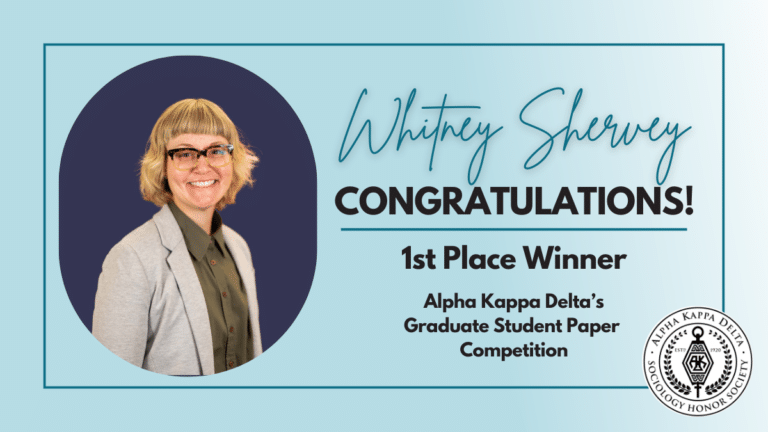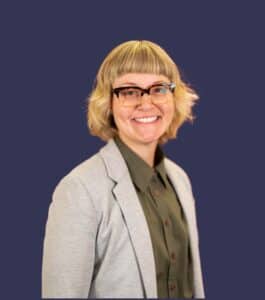
Editorial Note:
This blog feature was created by the Alpha Kappa Delta (AKD) Media Editor, Stephanie Wilson, in celebration of the first place winner in AKD’s 2024 graduate student paper competition, Whitney Shervey.
Each year AKD sponsors a graduate student paper competition. Winners are eligible to win cash prizes and travel money to attend the American Sociological Association annual conference. The first place winner received $500 and up to $1,000 in travel expenses to the 2024 annual meeting of the American Sociological Association.
Continue reading to learn more about Whitney Shervey‘s winning paper!
Meet Whitney Shervey

Whitney Shervey is a graduate student in Washington State University’s Department of Sociology. Their research interests include labor organizing in the restaurant industry at the intersection of gender, race, and class as well as how different forms of solidarity impact labor organizing efforts. Whitney’s insightful paper in these topics, “The Gender Wage Gap in the Restaurant Industry,” earned them a 1st place prize in the 2024 AKD graduate student paper competition.
To learn more about Whitney and their research, we reached out for a brief interview. Continue reading below to learn more about Whitney, their research, and their future goals as a sociologist!
Can you briefly summarize your award-winning paper?
This study investigates trends and determinants in the restaurant industry gender wage gap. Restaurant workers are among the lowest paid in the U.S. meaning that women make some of the lowest wages overall. Among all workers, the gender wage gap has been declining since the 1950s, though more slowly since the 1990s. Determinants of the gender wage gap in the restaurant industry have been seldom analyzed. Using data from the CPS and the Blinder-Oaxaca decomposition method, results from the Blinder-Oaxaca decomposition found that the explained portion of the wage gap decreased from 1992 to 2018 suggesting that discrimination and other characteristics not considered in the decomposition model increased from 1992 to 2018.
What motivated you to write on the topic of your paper?
I have worked as a professional cook for over 20 years and have experienced low wages, harassment, discrimination, and the precarity of the restaurant industry. It is my life’s work to transform the restaurant industry to be better off than I found it.
If you had to choose one major takeaway to share from your paper, what would that be?
The most surprising finding from the decomposition was the relative importance of the rural-urban divide in explaining the wage gap for both 1992 and 2018.
What have been your biggest “aha” moments while studying sociology?
The biggest learning moments that I continue to have throughout my scholastic journey always point me to rural sociology. I was born and raised in the city of Portland and had a narrow view of rurality. As an undergraduate student at Oregon State University, I studied natural resources where I had the opportunity to learn about rural issues from my peers that lived in rural Oregon. This experience helped me question my narrow view and created an ongoing curiosity for rural issues.
As a graduate student, last fall I took a course on rural sociology that solidified my curiosity, particularly the economic issues rural foodworkers face. Rural economies have shifted from natural resource extractive industries to the service industry. With my background in natural resources and as a cook, I see a place for me in rural sociology and look forward to more aha moments in the future that continue to challenge me to think deeper about rural issues.
How do you see yourself using sociology in your future career after earning your graduate degree?
I intend to use sociology to continue to interrogate inequality in the restaurant industry and the food system as a whole. As a researcher, I plan to use mix methods that highlight the lived experience of foodworkers. As an educator, I will use sociology to guide students in finding their place and voice so that they can build the world that they envision.